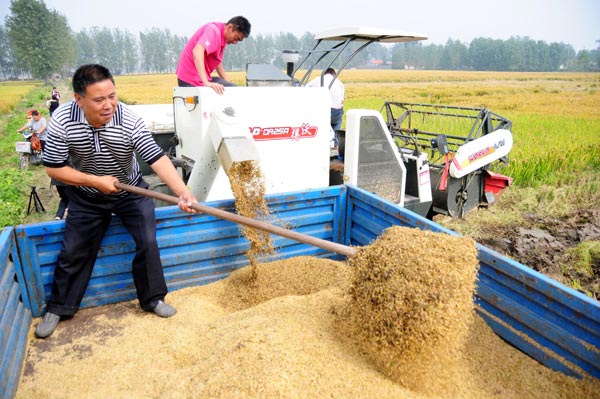Nation aims to cultivate growth of family farms
China will promote the development of family farms to facilitate specialized, intensive and large-scale agricultural operations by eliminating the shortcomings caused by traditional small-scale farming and urbanization, said a government official.
|
 Farmers reap rice in Linyi, Shandong province, on Monday. After years of reform and improvement in rural areas, China has established a system for agricultural operations. Fang Dehua / For China Daily |
Sun Zhonghua, director-general of the department of rural economic systems and management of the Ministry of Agriculture, said that along with a sustained and massive migration of young and middle-aged farmers, rural areas have seen their labor force grow older, more female and less educated.
Attracted by China's trade and manufacturing boom in the past two decades, many farmers from inland provinces or traditional agricultural regions such as Sichuan and Hunan pursued higher pay in the factory towns of coastal provinces such as Guangdong, Zhejiang and Jiangsu.
A study by the Beijing-based China Agricultural University undertaken in Hubei and Hunan provinces found the average age of farmers in these provinces is 53, and young people in rural areas are shunning farm life.
As the average age for a farmer rises, getting young people back on the land has become an urgent issue in rural areas, which cannot compete with the wages and living standards of cities.
The sector's major problems include rising production costs, worsening structural mismatches in the supply and demand of agricultural products and rapid social changes in rural areas, according to China's Report on the Work of the Government of 2013 released earlier this year.
After years of reform and improvement in rural areas, the nation has established a system for agricultural operations, where family farming lays a foundation and multiple production entities co-exist.
There are 226 million farming households, including 2.76 million major grain growers (defined as those with more than 3.3 hectares of land), 600,000 registered farmer cooperatives, 110,000 large agro-industry enterprises, emerging family farms and a variety of social service organization for agriculture.
Nevertheless, the existing system for agricultural operations isn't sufficiently specialized, well organized or commercialized.
To tackle these issues, the government formulated a comprehensive range of policies this year to accelerate rural land transfers and grant higher subsidies to large-scale landholders, family farms and rural cooperatives, to encourage the establishment of bigger, specialized farming units.
Sun said a registration system for family farms will be established in areas where conditions allow.

























